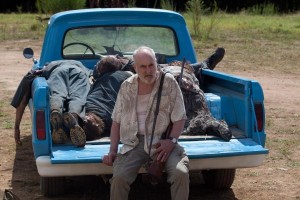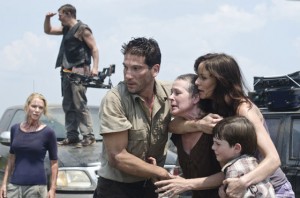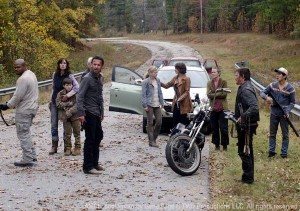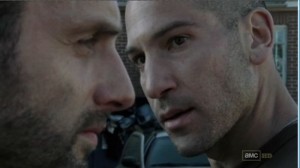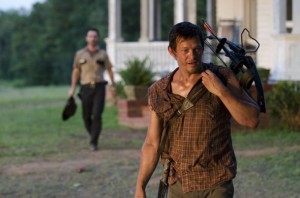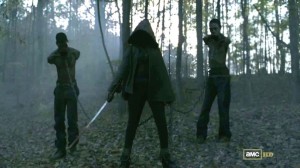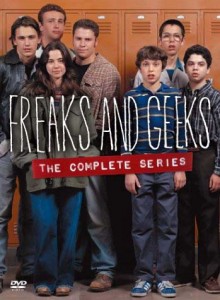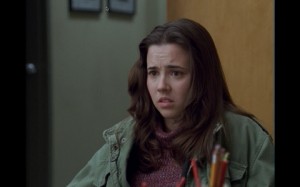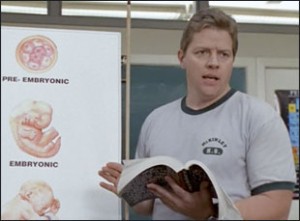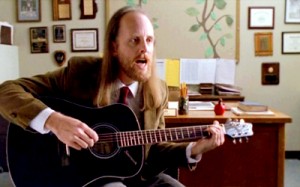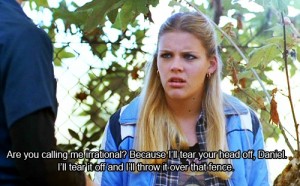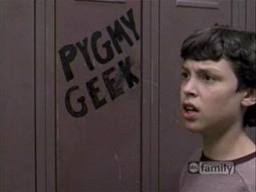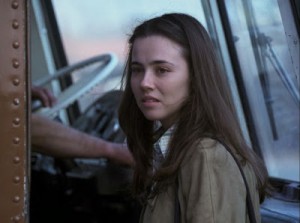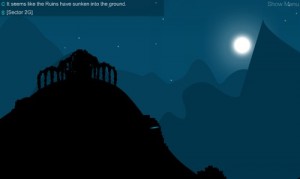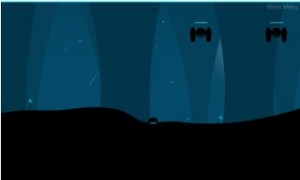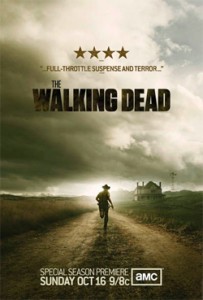 This week I finally got around to season 2 of The Walking Dead. You know, pretty much just as season 3 started playing on actual TVs…
This week I finally got around to season 2 of The Walking Dead. You know, pretty much just as season 3 started playing on actual TVs…
My review of the first season got trashed, so I’ll simply recap that I felt it teetered on the edge of having too many zombie horror cliches, and at times dragged on with repeated boring zombie action scenes. However, I felt season one had just enough novelty and character depth to complement the excellent production values and make The Walking Dead‘s debut arc rate highly. I also really loved a number of the visuals, such as Sheriff Rick riding back into Atlanta, on horseback, cars jammed to the horizon going the opposite way. Absolutely beautiful post-apocalyptic imagery.
Season two I actually found to be stronger. Following the trend of the action slowly diminishing over the course of the first season, which I thought improved it, the second is not particularly action oriented. This is no doubt driven in large part by real-world issues like having to build characters and fit within effects budgets, but it also makes sense in-world as things shake out and settle down a bit. That slower pacing has been panned in some circles, but I thought it properly placed the excitement on the drama and tension within the group, rather than the less interesting zombie gags and horror thrills.
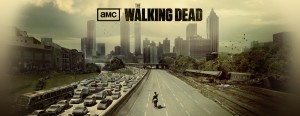
I think it’s actually more striking in the portrait cut, but this remains an excellent visual, as is the season two poster (above).
Other potential downsides are largely minimized. In standard horror fashion several characters become obnoxiously annoying over the course of season with their repeated, mindlessly poor decision making, though that’s basically a fair part of the genre and doesn’t go so far as to break the suspension of disbelief. Similarly, in a few places events or characters’ responses don’t make a ton of sense or seem consistent, but they’re minor enough to not derail things. Unfortunately, this season didn’t have quite the visual appeal of The Walking Dead‘s first go-around. There weren’t really any standout moments based on the sheer look of them, however the general production values remain super high and it’s enjoyable to walk. This season loses the majestic scope and ornate detail of the destroyed urban scenes in season one, but gains a lot of ominously wide open spaces, and a good juxtaposition of dark, brooding night scenes against brightly colored rural days.
Most importantly though, there is a lot going on with a number of the characters. Tensions boil along well all season, then pay off with a few fairly dramatic moments sprinkled throughout the last third. A few avenues are opened and then not really explored at all, but it’s a forgivable offense. In some cases relationships and situations probably actually wouldn’t have had time in-world to evolve much farther before being superseded by bigger events. As noted below, it’s sometimes difficult to subconsciously place the show within the very short timeframe it’s actually occupying. Other threads no doubt hit the cutting floor simply in favor of the larger narrative and bigger dramas. Fortunately, no lapse is so egregious as to really stand out as a hole.
In general, The Walking Dead still doesn’t really transcend any genre boundaries but it’s definitely toward the upper end of them, so I recommend it for anyone with any interests along the lines of zombies or post-apocalyptic fiction.
Beyond here I’m going to discuss a few thoughts on some particulars, so don’t read ahead if you haven’t watched! For what it’s worth in the following, I have not read the original graphic novels.
The Rest is Silence
>>> SERIOUSLY, MAJOR SPOILERS AHEAD. STOP READING. <<<
One thing I found interesting from a storyteller perspective is that the Walking Dead remains engaging despite being generally predictable in both big and small moments. Of course the well pump will break at the worst possible time. Of course the swimmer will rip apart and fall back into the well. Inevitably the two seedy guys in the bar try to jump the crew. Obviously the walker Carl stirs up will go and kill someone, probably Dale since he’s the outsider du jour. Clearly Glenn and Maggy will hook up and it’ll be serious. At almost every moment where a zombie “should” pop up, one does. Further, consider Shane, arguably the dramatic centerpiece of season two. He follows an almost completely expected path: Can’t get over Lori, has seemingly inconsequential sex with Andrea (one of the holes mentioned above—no aftereffects, no changed relationships from this???), kills all the walkers in the barn in a huge spectacle, tries to murder Rick, is killed by Rick, comes back as a walker and tries to kill Rick again.
The more I think about it, the more cliched and predictable it all seems. So it’s not super obvious what makes it all still work. Certainly some of it is the production values. A lesser zombie flick with the same story that tried to pull off this many cliches would almost certainly find itself languishing unwatched in my queue. Part is probably simply that the show stops just short of overwhelming with the cliches and non-surprises. To be fair, there are also just enough surprises to make it worthwhile. I have to admit I did not foresee Sophia being in the barn until immediately beforehand, and her re-appearance was definitely one of the more striking moments of the season.
Another part I think is hope, and the related notion that these are basically all doomed and in some cases tragic characters. Shane’s the most relevant here and I think squarely of the latter category. Throughout that long, foreseeable descent of his, I kept letting myself hope he’d regroup and they’d all move on together. He has so many positive qualities and is so likable, you just keep looking to him as a sympathetic character you want to succeed. A small but potentially big moment to me was when Shane starts killing zombies from the schoolbus using the trick Rick just taught him of wiping blood on a bottleneck and then stabbing them in the head. As Shane quietly sat there in the car on the way back, seemingly introspectively rather than broodingly or deviously, I really thought they’d hit the apex of their battle and that had been a sign of his rehabilitation. Like Rick, I thought they’d turned the page. But it was too big a course correction and down they went, right back on track. I guess that’s the power of archetypes and dramatic forms. No one complains that Hamlet‘s predictable just because Hamlet dies. As the tragic figure, that’s just the way it’s got to be.
The Living Will Envy the Dead
At first, the faint tease of the Michonne character (the hooded woman with the sword and chained slave walkers who appears at the very end of the finale) left me with a definite “WTF?!” feel. That brief glimpse just felt like a character and visual that belonged more properly in a fantasy story rather than Walking Dead‘s modern day. I’m still not convinced the character will really be executed well in the third season. However, I’m excited about what her appearance, literally, might entail.
One of the things I find most fascinating about post-apocalyptic fiction is looking at how the world diverges, and how quickly. That’s actually what I probably like the most of the Mad Max trilogy, seeing that evolution proceed throughout the three movies. In the first movie, the world has regressed and lots of characters are definitely pretty trippy, but basically relatable to our world. No one looks absolutely freakshow. In the second movie, the bad guys have definitely gone freakshow. By the third, the world has arguably stopped regressing and started moving in a new and crazy direction. As importantly, everyone has gone batshit insane: Bad guys, good guys, chaotic neutrals. The world has been spun, and both the people and the landscape have left ours.
Walking Dead is still pretty early in its evolution of the world, which it has generally advanced in fairly small steps. I’m so used to large and/or indeterminate amounts of time passing between TV episodes that it’s a bit of a shock every time a character references some earlier event as happening “yesterday” or “three weeks ago.” Time-wise they’re just not that far yet from the apocalypse.
So, till now, things have hewed fairly close to our world, caveat the minor detail of those pesky zombies. Everybody’s still basically normal. Civilization has most definitely collapsed, but things still kind of fit the mold. Look at the other groups we’ve seen: An urban gang, who in a nice twist is actually defending and caring for a bunch of elderly; a father desperately trying to hold together his farm and family; hints of a mottled gang that’s patched together since the apocalypse, looting, raping, and killing as it roams the countryside. None of this is particularly non-standard. The last one is upsetting and makes sense in a post-apocalyptic setting, but sadly it’s fairly normal. You could have the same thing and exactly the same looking guys in any modern day setting. In a mid-’80s urban world it probably wouldn’t even be much of a stretch. They’re certainly a far leap from the gangs of freaks, slavers, and cannibals dogging the protagonists’ steps in The Road.
Michonne, on the other hand, is different. Elf-like hood, samurai sword, walking around with two chained slave zombies with their arms and jaws cut off? That’s freak show. That’s the center not holding. Her brief cameo is our first real hint of not the cracks in civilization—those are omnipresent—but of people giving up even trying to paper over those cracks. From here is where we start to get into the crazy, and what it really really means to push people beyond the apocalypse.
The Walking Dead could certainly screw that all up going forward, but so far I think the show’s been well executed, so I’m eager to see where it continues to spin its broken world.
